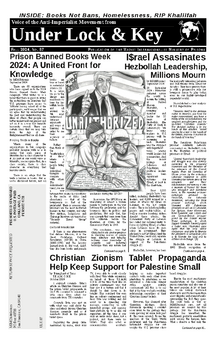Got legal skills? Help out with writing letters to appeal censorship of MIM Distributors by prison staff. help out
ALERTS
- WARNING: FBI tracks our visitors
- Sep 12: Follow us on Mastodon
MIM(Prisons) is a cell of revolutionaries serving the oppressed masses inside U.$. prisons, guided by the communist ideology of Marxism-Leninism-Maoism.
[About Us]
Campaigns
- We Demand Our Grievances are Addressed! (11/03/2024)
- Reject the I$raeli Settler State, Support the People of Palestine (10/30/2024)
- Prison Banned Books Week (10/20/2024)
- Build a United Front for Peace in Prisons (9/30/2024)
- Serve the People Political Books for Prisoners Program (9/21/2024)
Recent Posts
- On Homelessness: A Growing Site of Lumpen Organizing
- Is Grievance Campaign Revolutionary?
- Prisoners Reaching Students on Palestine
- U.$. Continues Illegal Funding to Zionist Terrorists
- Donkeys and Elephants
Censorship
- Valdosta State Prison in GA (9/22/24)
- 4th Ave Jail in AZ (9/18/24)
- Bledsoe County Correctional Complex in TN (9/18/24)
- Suwanee Correctional Institution in FL (9/15/24)
- GEO Bay Correctional Facility in FL (9/15/24)















Search Database:
| Click for more | STATE | DATE | TYPE | TITLE | REASON GIVEN | FACILITY | DIRECT LINK |
 | [IL] | 09/01/2012 | book | study group invitation | no information given except "banned from facility" written on envelope | Stateville Correctional Center |

|
Go to Page 1 [2] [3] [4] [5] [6] [7] [8] [9] [10] [11] [12] [13] [14] [15] [16] [17] [18] [19] [20] [21] [22] [23] [24] [25] [26] [27] [28] [29] [30] [31] [32] [33] [34] [35] [36] [37] [38] [39] [40] [41] [42] [43] [44] [45] [46] [47] [48] [49] [50] [51] [52] [53] [54] [55] [56] [57] [58] [59] [60] [61] [62] [63] [64] [65] [66] [67] [68] [69] [70] [71] [72] [73] [74] [75] [76] [77] [78] [79] [80] [81] [82] [83] [84] [85] [86] [87] [88] [89] [90] [91] [92] [93] [94] [95] [96] [97] [98] [99] [100] [101] [102] [103] [104] [105] [106] [107] [108] [109] [110] [111] [112] [113] [114] [115] [116] [117] [118] [119] [120] [121] [122] [123] [124] [125] [126] [127] [128] [129] [130] [131] [132] [133] [134] [135] [136] [137] [138] [139] [140] [141] [142] [143] [144] [145] [146] [147] [148] [149] [150] [151] [152] [153] [154] [155] [156] [157] [158] [159] [160] [161] [162] [163] [164] [165] [166] [167] [168] [169] [170] [171] [172] [173] [174] [175] [176] [177] [178] [179] [180] [181] [182] [183] [184] [185] [186] [187] [188] [189] [190] [191] [192] [193] [194] [195] [196] [197] [198] [199] [200] [201] [202] [203] [204] [205] [206] [207] [208] [209] [210] [211] [212] [213] [214] [215] [216] [217] [218] [219] [220] [221] [222]
